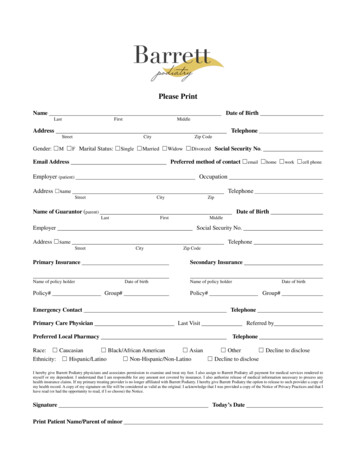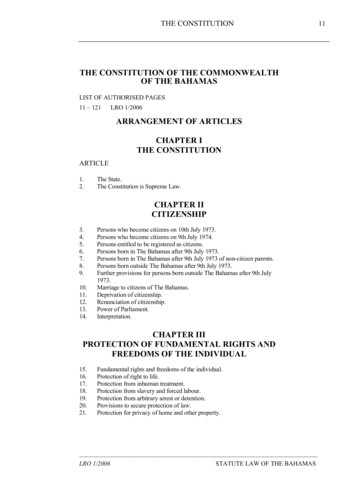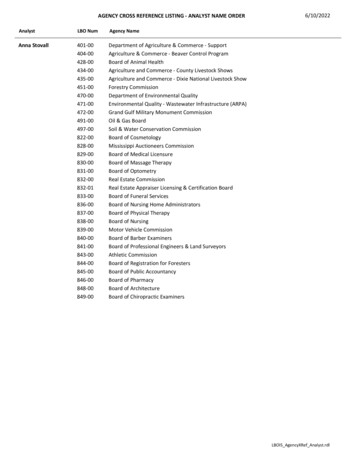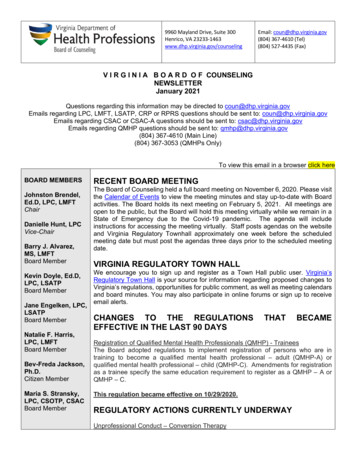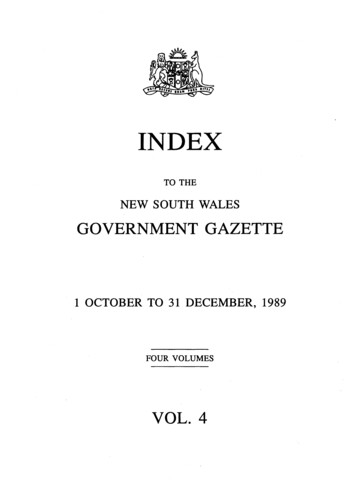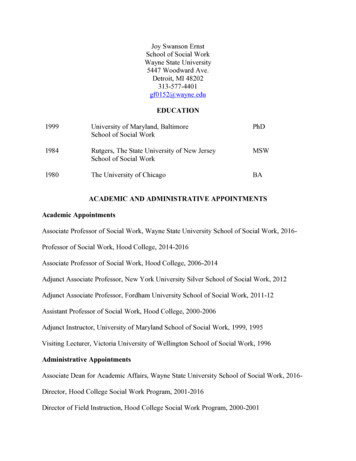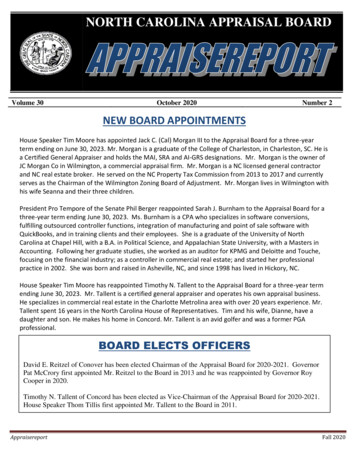
Transcription
NORTH CAROLINA APPRAISAL BOARDVolume 30October 2020Number 2NEW BOARD APPOINTMENTSHouse Speaker Tim Moore has appointed Jack C. (Cal) Morgan III to the Appraisal Board for a three-yearterm ending on June 30, 2023. Mr. Morgan is a graduate of the College of Charleston, in Charleston, SC. He isa Certified General Appraiser and holds the MAI, SRA and AI-GRS designations. Mr. Morgan is the owner ofJC Morgan Co in Wilmington, a commercial appraisal firm. Mr. Morgan is a NC licensed general contractorand NC real estate broker. He served on the NC Property Tax Commission from 2013 to 2017 and currentlyserves as the Chairman of the Wilmington Zoning Board of Adjustment. Mr. Morgan lives in Wilmington withhis wife Seanna and their three children.President Pro Tempore ofthe Senate Phil Berger reappointed Sarah J. Burnham to the Appraisal Board for a2019three-year termBoardendingMeetingJune 30,Dates2023. Ms. Burnham is a CPA who specializes in software conversions,fulfilling outsourced controller functions, integration of manufacturing and point of sale software withSeptember24November19 employees. She is a graduate of the University of NorthQuickBooks,and in trainingclientsand theirCarolina at Chapel Hill, with a B.A. in Political Science, and Appalachian State University, with a Masters inAll meetingsare conductedat the NorthCarolinaAccounting.Followingher graduatestudies,she worked as an auditor for KPMG and Deloitte and Touche,Appraisal Board building located at 5830 Six Forks Road,focusing on the financial industry; as a controller in commercial real estate; and started her professionalRaleigh.practice in 2002. She was born and raised in Asheville, NC, and since 1998 has lived in Hickory, NC.House Speaker Tim Moore has reappointed Timothy N. Tallent to the Appraisal Board for a three-year termending June 30, 2023. Mr. Tallent is a certified general appraiser and operates his own appraisal business.He specializes in commercial real estate in the Charlotte Metrolina area with over 20 years experience. Mr.Tallent spent 16 years in the North Carolina House of Representatives. Tim and his wife, Dianne, have adaughter and son. He makes his home in Concord. Mr. Tallent is an avid golfer and was a former PGAprofessional.BOARD ELECTS OFFICERSDavid E. Reitzel of Conover has been elected Chairman of the Appraisal Board for 2020-2021. GovernorPat McCrory first appointed Mr. Reitzel to the Board in 2013 and he was reappointed by Governor RoyCooper in 2020.Timothy N. Tallent of Concord has been elected as Vice-Chairman of the Appraisal Board for 2020-2021.House Speaker Thom Tillis first appointed Mr. Tallent to the Board in 2011.AppraisereportFall 2020
APPRAISEREPORTPublished as a service to appraisers to promote a betterunderstanding of the Appraiser’s Act and Board rules,as well as proficiency in appraisal practice.Information in the articles published herein may besuperseded by changes in laws, rules, or USPAP. Nopart of this publication may be reprinted or reproducedin any other publication without specific referencebeing made to their original publication in the NorthCarolina Appraisal Board Appraisereport.NORTH CAROLINAAPPRAISAL BOARD5830 Six Forks RoadRaleigh, North Carolina 27609Phone: 919/870-4854Fax: 919/870-4859Roy Cooper, GovernorAPPRAISAL BOARD tonChapel HillRaleighIndian BeachSTAFFDonald T. Rodgers, Executive DirectorSondra C. Panico, Legal CounselThomas W. Lewis, III, Deputy DirectorJeffrey H. Davison, InvestigatorH. Eugene Jordan, InvestigatorJacqueline Kelty, License and Renewal CoordinatorDeborah C. Liggins, Enforcement and AMC SpecialistPam A. Privette, Public Information SpecialistMindy M. Sealy, Office ManagerAPPRAISER COUNT(As of October 1, 2020)Trainees524Licensed Residential81Certified Residential1791Certified General1253Total Number3649AMC COUNT142APPRAISEREXAMINATION RESULTSFebruary 1, 2020 – September 30, 2020ExaminationLicensed ResidentialCertified ResidentialCertified GeneralTotal10217Passed582On May 14, 2020, the Board voted to adopt deadlineextensions under emergency rule 21 NCAC 57B .0615. If youdid not renew by June 30, 2020, your expiration date wasautomatically extended to September 30th. If you did notrenew by September 30, 2020, your license is now “lapsed”.On September 22, 2020, the Board voted to waive late feesthrough December 31, 2020.Website:www.ncappraisalboard.orgEmail Address:ncab@ncab.orgDavid E. ReitzelChairmanTimothy N. TallentVice-ChairmanClaire M. AufranceSarah J. BurnhamLynn CarmichaelJack C. (Cal) Morgan, IIIViviree ScottonH. Clay Taylor, IIIMike WarrenUpdate on Renewal Deadlines and Late Fees for Appraisersand AMCsFailed5135Appraisers must have completed the 2020-2021 7 HR USPAPUpdate before renewing. Once you have completed theUSPAP Update from a Board approved sponsor, please allowtime for the course sponsor to report it to the Board – theyhave up to 15 days to do so. Please do not send in yourcourse completion certificate, the roster must be submittedby the sponsor.Out of State licensees are also required to show that theyhave completed the 2020- 2021 7 Hour USPAP Update. If thecourse is completed through a Board approved sponsor, youshould have the sponsor report your course completion to theNC Appraisal Board. If the course was taken from a sponsornot on our approved list, you may submit the Affidavit form tothe Board. Please email the Board at ncab@ncab.org torequest the form.AMCs who do not renew by December 31, 2020 willpermanently expire. You will then have to file a newapplication for registration.To view a current list of continuing education courses approvedby the Board, please visit our website n edu.htm.All CE may be taken online or in class.Examinations are administered by a national testingservice. To apply for the examination, please submitan application which may be downloaded from theAppraisal Board’s website htm.AppraisereportFall 2020
Assignment Conditions and Business PracticeClient instructions and assignment conditions are essential considerations for appraisers when theyconsider accepting an assignment. Each assignment requires the appraiser to analyze and execute theappropriate scope of work that leads to credible results. Failure of the appraiser licensee to study andunderstand the terms of the engagement can often lead to the filing of a complaint.USPAP defines scope of work as the type and extent of research and analysis in an appraisal or appraisalreview assignment. Analysis of assignment elements guides the scope of work. The following are vitalconsiderations in an assignment: who is the client and whether there are any other intended users;intended use of the appraiser’s opinions and conclusions; type and definition of value; effective date ofthe appraiser’s opinions and conclusions; subject of the assignment and its relevant characteristics; andassignment conditions. Before agreeing to perform an appraisal, the expectation is that the appraiserlicensee has thoroughly and thoughtfully analyzed the assignment elements.The appraiser is always responsible for selecting the scope of work necessary for credible assignmentresults. When the client’s assignment conditions are too restrictive, it is up to the appraiser to conferwith the client and consider modifying the assignment conditions to allow for credible assignmentresults. Otherwise, if this is not possible, the appraiser should decline or withdraw from the assignment.The acceptance of an assignment means the agreement or contract to perform services under an agreedset of conditions. Assignment conditions are assumptions, extraordinary assumptions, hypotheticalconditions, laws and regulations, jurisdictional exceptions, and other conditions that affect the scope ofwork. Other requirements associated with the assignment are typically considered client instructions,which can be equally as significant as assignment conditions for an appraiser fulfilling an assignment.For example, if you have ever pursued financing to purchase a home or sold a property, you understandthat the mortgage lending process can be multitiered and involve not only numerous steps but alsomultiple professionals. Each of these professional’s efforts is linked to the information and servicesprovided by other professionals to provide the most accurate information to the client. In most instances,the performance of all these tasks are under time restraints related to the loan origination andunderwriting process.Recently the Board Staff has received complaints and calls from various parties related to appraiserlicensees that have failed to complete and deliver appraisal reports within the time specified as part oftheir engagement order. Other complaints that the Board has received concern the appraiser licenseesuddenly becoming unresponsive to the client. While these types of allegations do not necessarilypertain to the actual development of an opinion of value, they relate to the appraiser’s professionalobligations. Failing to provide assignment results when agreed upon may create an undue hardship onthe consumer by jeopardizing the loan closing and, in some cases, result in the payment of additionalmonies and fees. Furthermore, the Board may consider repeated complaints of delinquency to beimproper or dishonest conduct by the appraiser licensee.The Board Staff would recommend that appraiser licensee competently evaluate their engagementbefore acceptance. Also, remaining accessible to the client and their assigns and communicatingpotential delays in advance of a pending due date is professional business practice and may help defusea situation that could lead to a complaint.AppraisereportFall 2020
Acceptable Appraisal ExperienceAs a result of the global pandemic, more and moretrainees are completing appraisal assignments under thesupervision of their supervisors that do not includeinterior inspections. Appraisals, especially residentialappraisals performed without a physical inspection,represent a considerable departure from the moretraditional appraisal experience. Here is a series ofQuestions and Answers that can help RegisteredTrainees and their supervisors better understand therequirements.Q: Must a Registered Trainee sign the appraisalreport to receive experience credit?A: Not necessarily. For a Registered Trainee to receiveexperience credit for an assignment, the RegisteredTrainee must: Sign the appraisal report; orBe identified in the appraisal report as havingprovided significant real property appraisalassistance with that assistance summarized orstated (depending on the reporting option).Be identified in the certification as havingprovided significant real property appraisalassistance when doing so is applicable.Q: As a Registered Trainee, can I receive experiencecredit for assignments performed withoutinspection?A: Yes. Not every appraisal assignment requires aninspection. Assignment conditions and scope of workcould determine that it could be completely acceptablefor an assignment without a physical inspection, such asin the case of a "desktop appraisal." A RegisteredTrainee may receive experience credit for such anassignment. The trainee must participate in at least75% of the assignment and under the supervision oftheir supervisor.Q: As a Registered Trainee, am I required to beaccompanied by my supervisor on my first 50assignments?A: Your supervisor must accompany you on those first50 assignments or your first 1500 hours of appraisalexperience, whichever comes first. The requirementAppraisereportthat the supervisor accompanies their RegisteredTrainee applies only to those assignments that require aphysical inspection.Q: Does the Board consider a minimum or amaximum number of experience hours for eachassignment type?A: No. The Board Staff does not recognize anyminimum or a maximum number of hours for aparticular assignment type. Experience credit is basedupon actual hours spent researching, developing, andultimately communicating an opinion of value orpreparing an appraisal review under the supervisor'ssupervision. The workfile in support of your appraisalreport should be documented and substantial enough tosupport the number of hours claimed for eachassignment.Q: As a Registered Trainee, may I receiveexperience credit for measuring houses or takingphotographs?A: No. You may earn experience credit by performingappraisals and appraisal reviews under the supervisionof your supervisor. Time spent measuring houses ortaking photographs for some other purpose other thanfor the development and communication of an appraisalreport or an appraisal review assignment under thesupervision of your supervisor will not count towardyour experience requirement.Q: As a Registered Trainee, I cannot find asupervisor that can help me obtain all the hours Ineed to apply for an upgrade. Am I allowed to havemore than one supervisor?A: Yes. As a Registered Trainee, you may have morethan one supervisor. There are restrictions, however, tothe number of trainees that a supervisor may supervise.Just remember that your supervisors are responsible foractively supervising you as a Registered Trainee.Active supervision means that the supervisor must beable to direct, guide, and support you. The supervisingappraiser shall have input into and knowledge of theappraisal report before its completion and shall makeany changes to the report before transmission to theclient.Fall 2020
Q: I am a Registered Trainee under the supervisionof a supervisor that is licensed here and in aneighboring state. I occasionally work with mysupervisor on assignments in the neighboring state.May I count those hours that I obtained working onthose out of state assignments toward my experiencecredit here in NC?A: Possibly. It is the applicant's responsibility todemonstrate to the Board that they meet all therequirements for the upgrade of their credential.Experience obtained by a Registered Trainee in anotherjurisdiction may be acceptable for experience creditunder the following criteria: The Registered Trainee must demonstrate thatthey are appropriately credentialed and oreligible to perform appraisal services under thesupervision of their supervisor in the jurisdictionwhere the subject assignment is locatedThe Registered Trainee must demonstrate thatthe appraisal is compliant with USPAP, statelaw, and the jurisdiction's administrative rules.The Registered Trainee must have signed theappraisal report oro be identified in the appraisal report ashaving provided significant real propertyappraisal assistance with that assistancesummarized or stated (depending on thereporting option).o be identified in the certification ashaving provided significant real propertyappraisal assistance when doing so isapplicable.The Registered Trainee must submit a log of allassignments performed. The log must be appropriatelycompleted following the NC Board's administrativeRules and signed by the trainee and their supervisor.The trainee must also be able to produce the reports andworkfiles identified on the appraisal log. During theexperience review, the Board Staff will request samplesof the applicant's work.AppraisereportQ: Recently, the Appraiser Qualification Board ofThe Appraisal Foundation has publishedinformation about an alternative method for gainingappraisal experience that could allow a RegisteredTrainee to acquire all or some of their experience inthe classroom. Is this possible in NC?A: Not presently. There is no current course approvedin NC that would satisfy the non-traditional clientexperience requirement. The program referred toabove is known as Practical Applications for RealEstate Appraisal (PAREA). PAREA is only a conceptat this point. If PAREA were to be adopted by theAQB, it would include the generally applicablemethods of appraisal practice. Content could requirethe student to produce credible appraisals that utilize anactual subject property, performing market researchcontaining sales analysis, and applying and reportingthe applicable appraisal approaches in conformity withUSPAP.Should the AQB adopt and implement PAREA, it couldaffect requirements here in North Carolina, making itpossible to obtain appraisal experience in differentways from the traditional method. It is important tonote, however, that it is unknown if any such significantchange will be implemented here in NC until the Boardhas considered the matter.Q: As a Registered Trainee, am I allowed to preparedemonstration appraisals for experience credit?A: Yes. A demonstration appraisal differs from thetraditional appraisal assignment in that there is noclient. A Registered Trainee may develop and preparea written appraisal report of an actual property or realproperty interest without a traditional assignment froma client to obtain experience hours. For such anappraisal to count for experience credit, the RegisteredTrainee must have prepared and produced the appraisalreport under the supervision of their supervisor. Also,the appraisal must be compliant with all applicablelaws, rules, and the Uniform Standards of ProfessionalAppraisal Practice. Demonstration reports should beidentified on the trainee's log, and the applicant musthave a workfile in support of the demonstrationappraisal. An applicant may claim no more than 25% oftheir experience from demonstration appraisals.Fall 2020
USPAP Q&AThe Appraisal Standards Board (ASB) of The Appraisal Foundation develops, interprets, and amends the Uniform Standards of Professional Appraisal Practice(USPAP) on behalf of appraisers and users of appraisal services. The USPAP Q&A is a form of guidance issued by the ASB to respond to questions raised byappraisers, enforcement officials, users of appraisal services and the public to illustrate the applicability of USPAP in specific situations and to offer advice from theASB for the resolution of appraisal issues and problems. The USPAP Q&A may not represent the only possible solution to the issues discussed nor may theadvice provided be applied equally to seemingly similar situations. USPAP Q&A does not establish new standards or interpret existing standards. USPAP Q&A isnot part of USPAP and is approved by the ASB without public exposure and comment.2020-01: APPRAISAL DEVELOPMENT – INSPECTIONSInterior Inspections during a National Health EmergencyQuestion: Are appraisers required to perform interior inspections of real property during a national health emergency?Response: Appraisers and users of appraisal services should remember that USPAP does not require an inspection unless necessary to producecredible assignment results. (Please refer to USPAP Standards Rule 1-2, Standards Rule 2-2, and Advisory Opinion 2 for further guidance.)When an interior inspection would customarily be part of the scope of work, a health or other emergency condition may require an appraiser tomake an extraordinary assumption about the interior of a property. This is permitted by USPAP as long as the appraiser has a reasonable basisfor the extraordinary assumption and as long as its use still results in a credible analysis. Neither the Appraisal Standards Board (ASB) nor TheAppraisal Foundation has the authority to suspend interior inspections. Appraisers are encouraged to communicate with their clients and followpublic health recommendations (such as those issued by the CDC and World Health Organization), as well as national, state, and localgovernment orders when performing appraisal assignments. The ASB and The Appraisal Foundation encourage lenders, regulators,government agencies and Government Sponsored Enterprises (GSEs) to consider suspending or relaxing requirements for interior inspectionsduring a national health emergency.2020-02: APPRAISAL REPORTING – CERTIFICATION AND SIGNATURESModification of a “Standard” Appraisal Form with a Fixed Certification and Scope of WorkQuestion: In response to the COVID-19 outbreak, I have been asked to complete a desktop or exterior-only appraisal, but to report the resultsusing a GSE form designed for an appraisal with an interior and exterior inspection. Although the Government Sponsored Enterprise (GSE)forms indicate that modifications to the scope of work and statement of assumptions and limiting conditions is not allowed, I have been askedto modify those portions of the report and have been provided with a suggested replacement. Can I do this? Would this result in a misleadingappraisal report?Response: In and of itself, with proper disclosure, the modification of a “standard” appraisal report form does not result in a misleadingappraisal report; but this is only true if the modifications do not create a conflict that cannot be properly understood. In response to the COVID19 outbreak, the GSEs have temporarily rescinded their policies that prohibit revising or amending the scope of work and statement ofassumptions and limiting conditions. The GSEs have also authorized the use of specific replacement language, which can be found on theirwebsites. Lenders who work with GSEs have been made aware of these policy changes. So, use of the GSE-authorized replacement wording inthese specific circumstances would not be misleading to the client or other intended users. Regardless of any instruction provided by the GSEsor any other users of appraisal services, appraisers are reminded that it is up to the appraiser to determine that adequate information is availableto produce credible results. If adequate information is not available about the property, and/or if extraordinary assumptions cannot be made inaccordance with USPAP requirements, then the appraiser may not perform the appraisal.2020-03: APPRAISAL DEVELOPMENT – PERSONAL PROPERTY INSPECTIONSPersonal Inspections during a National Health EmergencyQuestion: Do personal property appraisers need to perform personal inspections during a national health or other emergency?Response: Appraisers and users of appraisal services should remember that USPAP does not require an inspection unless necessary to producecredible assignment results. (Please refer to USPAP Standards Rules 7-2 and 8-2 and Advisory Opinion 2 for further guidance.) When apersonal inspection would customarily be part of the scope of work, a health or other emergency condition may require an appraiser to make anextraordinary assumption about the identification, relative quality, etc. of the subject property. This is permitted by USPAP as long as theappraiser has a reasonable basis for the extraordinary assumption, as long as its use still results in a credible analysis, and as long as theappraiser complies with the reporting requirements in Standards Rule 8-2(a)(xiii) or (b)(xv). Thus, if appraisers rely on photographs, purchasereceipts, inventories, maintenance logs, etc. to identify the subject property, they must reasonably believe the sources are reliable. Appraisersmust also reasonably believe the sources are adequate for identifying the other characteristics of the property that are relevant to the type anddefinition of value and intended use of the appraisal, as specified in Standards Rule 7-2(e)(i-vi). Personal property appraisers are cautioned touse great care in the use of an extraordinary assumption in lieu of a personal inspection. It may not be possible to identify relevantcharacteristics of some assets or to perform certain assignments without actually performing a personal inspection of the subject property.Some examples include, but are not limited to, when the scope of work makes it necessary for the appraiser to: determine whether the subject isAppraisereportFall 2020
a painting or a giclée print on canvas; obtain technical information about a diamond; ascertain a property’s current condition; or confirm itsvery existence. In these cases, the appraiser cannot provide a credible appraisal without conducting a personal inspection.2020-04: APPRAISAL DEVELOPMENT–INSPECTIONSPersonal Inspection of Exterior plus Remote or Virtual Inspection of InteriorQuestion: If an appraiser makes a personal inspection of the exterior of a property as part of a mortgage finance transaction (or inany other assignment) and then receives interior photos, video, or other technology-based view(s) of the subject, can the appraiser state thatthey performed an interior inspection?Response: No. A personal inspection of the interior of the property by the appraiser is not the same as viewing the interior virtually orremotely. It would be misleading for an appraiser to indicate that an interior inspection of the subject property was performed, when, in fact,the appraiser only viewed interior photos, video, or other data from technological solutions. (See Conduct section of the ETHICS RULE,Disclosure Obligations of the SCOPE OF WORK RULE, and Advisory Opinion 2, Inspection of Subject Property.)In MemoryofCharles G. Bass, Sr.The North Carolina Appraisal Board, with regret, announces the death offormer Board member Charles G. Bass, Sr. He was appointed to theAppraisal Board by Governor James B. Hunt in 1995 and served on theBoard until 2001. A Certified General Appraiser, Mr. Bass worked 12years with the Highway Department. He retired after 30 years as Sr. VicePresident with First Citizens Bank. He was a Member of the AppraisalInstitute holding the MAI and SRPA designations. Upon his retirementfrom the bank in 1991 he formed The Bass Corporation where hecontinued to work as a real estate appraiser with his daughter, Melanie,who joined him there in 1992. He retired from appraising in 2015 and issurvived by his wife, Shirley, and daughter, Melanie. The members andstaff of the Appraisal Board offer our deepest sympathy to the Bassfamily.Remaining2020 BoardMeeting DatesNovember 17All meetings areconducted at the NorthCarolina AppraisalBoard building locatedat 5830 Six ForksRoad, Raleigh unlessotherwise posted.REMINDER:The Board is allowing sponsors the opportunity to offer, in class CE courses virtually, through December 31,2020! Online Qualifying education courses, for becoming a registered trainee, are also being allowedthrough this date. Please note that if you register for the online qualifying education courses by December31, 2020, they can still be completed online according to the course sponsor’s policy to complete thecourse.AppraisereportFall 2020
Disciplinary Actions:The following is a summary of recent disciplinary actions taken by the Appraisal Board. This is only a summary; for brevity, some of the factsand conclusions may have not been included. Because these are summaries only, and because each case is unique, these summaries shouldnot be relied on as precedent as to how similar cases may be handled.In many cases, appraisers are required to complete additional education as part of a consent order. Please check with the Boardoffice if you have questions regarding an individual’s current license status.Appraisers:Donald Brady A3798 (Scotland Neck)By consent, the Board voted that effective March 25,2020, Donald Brady’s certification as a general appraisershall be Suspended for a period of one year, all of whichshall be an inactive suspension. Respondent shallcomplete a 15-hour Uniform Standards of ProfessionalAppraisal Practice (USPAP) course, including the examand he shall complete a 7-hour course in appraiserliability or common errors no later than September 25,2020. In addition, Respondent shall not conduct anyappraisal reviews until he completes a 4-hour course inreviewing residential appraisals. If Respondent fails tosuccessfully complete the USPAP and appraiserliability/common errors course work by September 25,2020, the inactive suspension shall become active for theremainder of the suspension. The hours from the abovecourses shall not be used for the Respondent’scontinuing education requirements, as set forth in Boardrules.On June 10, 2019, Respondent accepted an assignmentto complete a field review of a property located inRoanoke Rapids, North Carolina. The assignment wasrequired to be completed on FNMA Field Review Form2000 and was due on June 12, 2019. On June 24, 2019,Respondent sent in the appraisal report, after beingcontacted several times about when he would submit it.Respondent did not complete the assignment as ordered.He completed a FNMA 2055 Exterior, which was not thecorrect form. Respondent did not execute the appropriatescope of work for the assignment. As a result, he did notperform the assignment that was requested by the client.The report that was submitted contained numerous errorsand inconsistencies. The client subsequently cancelledthe assignment, as the analysis could not be used, and thereport was very late. In response to the complaint,Respondent did not submit the appraisal report or hisworkfiles, as requested by Board. Respondent’s conductAppraisereportconstitutes violations of N.C. Gen. Stat. § 93E-112(a)(6) and (a)(9).Claud Clark, III A7692 (Magnolia Springs, AL)By consent, the Board voted that effective June 2, 2020,Claud Clark’s certification as a general appraisal shall besuspended for a period of eight months; of which the firsttwo months shall be an active suspension and theremaining six months shall an inactive suspension. Oncethe active suspension has been completed, Respondentmay renew his license in North Carolina and will not becharged a late penalty.The North Carolina Appraisal Board receivedinformation that Respondent’s certified general realestate appraiser credential was voluntarily revoked inAlabama, effective on May 16, 2019. Respondent wasrequired to report the voluntary revocation of his licensein Alabama to the North Carolina Appraisal Boardwithin 60 days of the revocation. Respondent failed toreport the voluntary revocation to the North CarolinaAppraisal Board. The conduct described aboveconstitutes violations of N.C. Gen. Stat.§§ 93E-112(a)(9), (b)(4), & (b1) and 21 NCAC 57A .0409.Joel Cl
daughter and son. He makes his home in Concord. Mr. Tallent is an avid golfer and was a former PGA professional. BOARD ELECTS OFFICERS David E. Reitzel of Conover has been elected Chairman of the Appraisal Board for 2020-2021. Governor Pat McCrory first appointed Mr. Reitzel to the Board in 2013 and he was reappointed by Governor Roy Cooper in .

